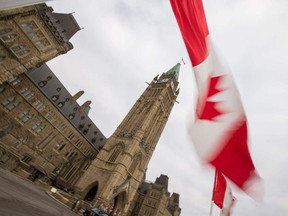C.D. Howe authors say lack of transparency in budget process left governments unaccountable for spending decisions
Article content
Canada’s senior governments weren’t transparent enough about the additional $309 billion spent during the COVID-19 crisis, argues a new report from the C.D. Howe Institute, which calls for improvements to the budgeting process.
Advertisement 2
Article content
“The decisions that got made that are going to affect our future for years and decades to come, were really made on the fly without appropriate deliberation,” said Bill Robson, chief executive of the think-tank and co-author of the study, released July 11. “We need more transparency from our governments about how they’re spending our money, especially when something like COVID happens.”
Article content
Most Canadians are unaware of the scale of the debt governments amassed during the pandemic, and the fact that they’ll need to pay for them in the coming years with their taxes, Robson said.
“Here we had this major crisis. We have all these debts that are going to now have to be serviced,” he said, noting interest rates are much higher today than they were during the pandemic.
Advertisement 3
Article content
“So you got to, at some point, have a broad-based tax increase to pay for all this stuff. And we’re not hearing about that.”
It won’t be pleasant. “We have a few lean years ahead,” he added.
We have a few lean years ahead
Bill Robson, chief executive, C.D. Howe Institute
In 2020, any member of the public who wanted to review the government budgets to see exactly how taxpayer dollars were being used would have found it difficult to do so. Some governments published budgets long after the April 1 fiscal deadline.
For example, Ontario did not produce its budget until May 2020, while Saskatchewan and Prince Edward Island did not release theirs until June. Newfoundland and Labrador released theirs extremely late, in September. The federal government did not release a budget at all, the report notes.
Article content
Advertisement 4
Article content
“If a government doesn’t present a budget until after the fiscal year has already started, then very straightforwardly they’re just doing what they want, without authorization from the Legislature,” Robson said.
When, at last, the budgets were released, they revealed enormous pandemic spending. “Future historians of public finances in Canada will see from a glance … that something remarkable happened in the 2020/21 fiscal year,” the report notes.
Looking at revenues, it’s hard to tell the pandemic even happened at all. The federal government made transfer payments to individuals and businesses, which kept the provinces and territories afloat.
Government spending, however, increased across the board, with some governments spending more than others.
Advertisement 5
Article content
The spending of provincial and territorial governments jumped seven per cent on average in 2020, while the federal government’s spending jumped 70 per cent.

Spending went up, but revenues stayed the same, causing a $368-billion increase in the combined debt of senior governments, of which $327 billion was an increase in the federal government’s debt, the report notes. This means that Canada’s governments might struggle to deliver services in the future, the report said.
But it is still difficult to understand the full scope of the spending just by looking at the budgets. Variation in the accounting methods used make it difficult to get a full picture of the expenses, Robson said. “It’s a bit unsettling that so many questions just never got answered … The information is so patchy.”
Advertisement 6
Article content
This lack of transparency is a long-standing problem with Canada’s governments, he said.
Estimates of revenue and spending are consistently incorrect, Robson said. “What we’ve seen over the past 20 years is that there’s very consistent under-projection of revenue and under-projection of spending … So there’s something wrong with the way governments are presenting the numbers there.”
The report concludes that governments should adjust the way they report their revenues and expenses, clearly stating certain subcategories instead of lumping them in with others, such as returns on investment; the cost of servicing debts; gross revenue and expenses; transfers; and spending on major programs, such as health care. Overall, they should be more forthcoming on whether or not they are actually meeting budgetary promises, the report recommends.
Advertisement 7
Article content
When the numbers aren’t presented comprehensively — and on time — it becomes more difficult to hold a government to account, Robson said. “There are all kinds of pressures all the time on governments to kind of hide information and to sideline the elected representatives or maybe hide information from the public.”
He argued that the think-tank has observed troubling centralization within the current government, wherein there are announcements about spending measures that have not been reviewed by the legislature.
Things are just deemed approved and so an awful lot of spending just happens without appropriate scrutiny by legislators
Bill Robson
“Things are just deemed approved and so an awful lot of spending just happens without appropriate scrutiny by legislators,” he said.
This happened during the pandemic, too, he said.
“If during COVID, the prime minister had stood up and said, ‘We’re going to put all these things in place and we’ll double the GST to pay for it in a few years time, then people would have said, of course, ‘Maybe that’s too much of a good thing.’ But we never had that conversation,” he said.
Advertisement 8
Article content
Much of the blame lies with elected members of Parliament. “I think part of the problem (was) that you didn’t have enough MPs standing up and saying, wait a minute, like you’re totally sidelining Parliament,” Robson said.
Legislators need to scrutinize government expenses more closely, and demand greater accountability, the report concludes.
“We ought to be able to rely on the government to present the information and for MPs to act on it. And in this instance, the government didn’t present the information, and MPs were willing to let it go. I think we need to call them on it and say, ‘Do your job.’”
• Email: mcoulton@postmedia.com | Twitter: marisacoulton
Article content
Canadians to pay for pandemic spending with their tax dollars: report
2023-07-12 14:37:27






Comments
Postmedia is committed to maintaining a lively but civil forum for discussion and encourage all readers to share their views on our articles. Comments may take up to an hour for moderation before appearing on the site. We ask you to keep your comments relevant and respectful. We have enabled email notifications—you will now receive an email if you receive a reply to your comment, there is an update to a comment thread you follow or if a user you follow comments. Visit our Community Guidelines for more information and details on how to adjust your email settings.
Join the Conversation